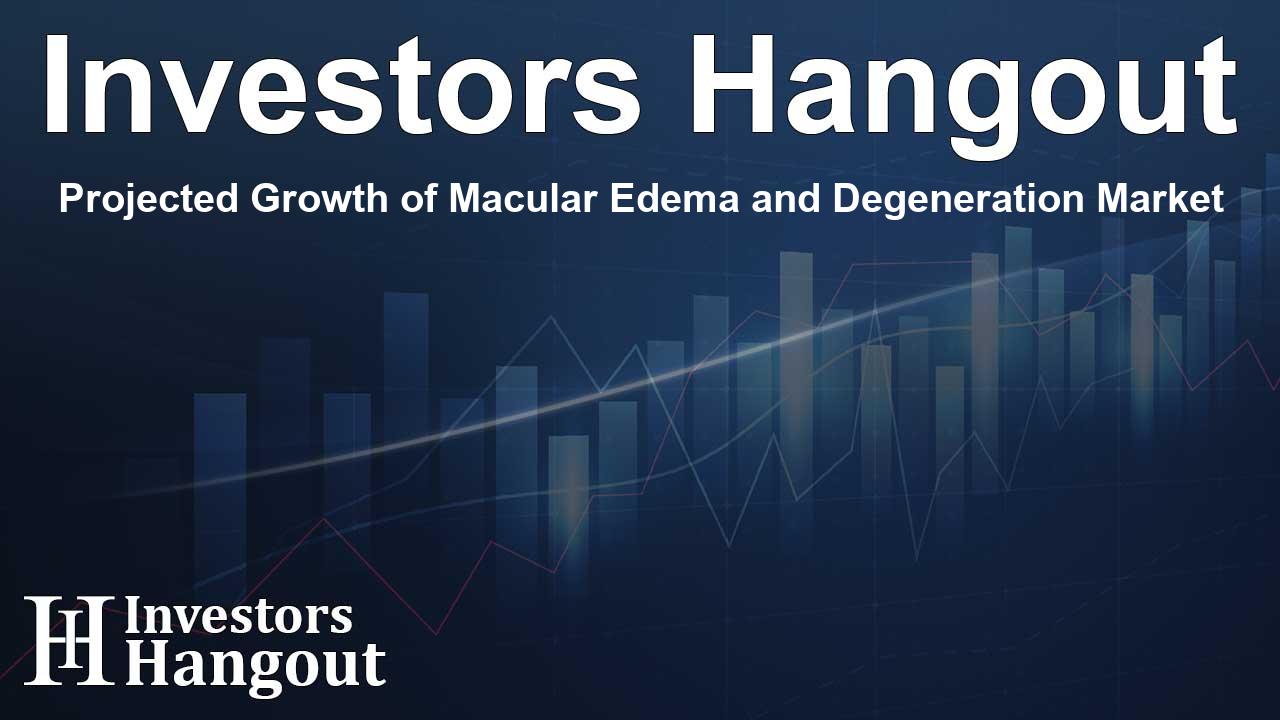Projected Growth of Macular Edema and Degeneration Market

Projected Growth of Macular Edema and Degeneration Market
The global macular edema and macular degeneration market is experiencing remarkable growth, anticipated to increase from USD 10.33 billion in 2024 to approximately USD 22.51 billion by 2034. This steady rise of around 7.34% CAGR is primarily attributed to heightened awareness about age-related vision disorders and advancements in treatment modalities.
Understanding the Impact of AI in the Market
Artificial Intelligence (AI) is transforming various aspects of healthcare, and the management of macular conditions is no exception. Utilizing deep learning (DL) technology, healthcare professionals can now diagnose age-related macular degeneration (AMD) more effectively, predict hospitalization risks, and assess the necessity for treatment injections within a two-year timeframe. Such innovations not only enhance the accuracy of treatments but also empower patients with better compliance, ultimately promoting healthier outcomes.
Benefits of AI Integration
The incorporation of intelligent tools into the management of diabetic macular edema (DME) is promising. These tools optimize treatment efficiency, tailor care to individual needs, and lower costs for both healthcare providers and patients. As a consequence, the demand for market solutions will continue expanding in the coming years.
Market Dynamics and Opportunities
In recent years, the surge in diabetes prevalence and evolving lifestyles have contributed significantly to the growth trajectory of the macular edema and degeneration market. This trend is compounded by a growing aging population, which is becoming increasingly attractive to investment firms and market analysts. Advanced therapies, particularly anti-VEGF treatments, are shifting consumer preferences towards drug therapies rather than surgical approaches.
Long-Acting Drug Development
The pharmaceutical industry is focused on developing long-acting drug delivery systems, which hold the potential for considerable market advantages. Patients are actively seeking solutions that minimize the need for painful frequent injections, positioning sustained-release formulations as a favorable alternative. Such innovations are likely to enhance patient compliance and treatment outcomes.
Challenges Impacting Market Growth
Despite the optimistic outlook, challenges remain evident in the regulatory landscape. High costs and complex approval processes pose significant hurdles for pharmaceutical companies. Treatment options like anti-VEGF necessitate stringent sterile handling and extensive clinical trials, which could impede market advancement. Nevertheless, overcoming these challenges is essential for sustaining industry growth.
Regional Insights into Market Dynamics
North America has emerged as a leader in the macular edema and degeneration market, driven by increasing public awareness regarding visual health and access to advanced healthcare technologies. The healthcare infrastructure in the region bolsters its position, appealing to a global population seeking enhanced treatment options.
Growth in European Markets
On the other hand, Europe is on track to experience significant growth in the market. Early detection programs and increased investment in ophthalmic research by large pharmaceutical brands are propelling this upward trend. Countries like the U.K. and Germany are actively promoting healthcare initiatives that focus on eye care, which are likely to yield favorable advancements in the sector.
Market Segmentation Overview
The market can be segmented into different categories based on treatment type, application, and end users. Drug therapies are currently dominating due to their effectiveness and minimal invasiveness. Age-related macular degeneration (AMD) continues to require significant attention as it remains one of the leading causes of vision loss among individuals over 50.
Key Players in the Industry
Several companies are pivotal to the market's growth, including Kubota Pharmaceutical Holdings Co. Ltd, AbbVie Inc, and Novartis AG. Their commitment to innovation and developing new treatment avenues plays a crucial role in shaping the future landscape of the macular edema and degeneration market.
Frequently Asked Questions
What factors are contributing to the market growth?
Rising diabetes cases, aging populations, and advancements in therapeutic options are key contributors to growth.
How is AI impacting treatment methods?
AI enhances diagnostic accuracy and treatment personalization, leading to improved patient compliance and outcomes.
What are the challenges facing drug manufacturers?
High costs, complex regulations, and the need for extensive clinical trials impede progress.
Which regions are leading in market share?
North America currently dominates the market due to advanced healthcare infrastructure and widespread awareness.
What future developments can we expect?
Innovations in long-acting drug delivery systems and greater focus on patient-centric therapies are on the horizon.
About The Author
Contact Caleb Price privately here. Or send an email with ATTN: Caleb Price as the subject to contact@investorshangout.com.
About Investors Hangout
Investors Hangout is a leading online stock forum for financial discussion and learning, offering a wide range of free tools and resources. It draws in traders of all levels, who exchange market knowledge, investigate trading tactics, and keep an eye on industry developments in real time. Featuring financial articles, stock message boards, quotes, charts, company profiles, and live news updates. Through cooperative learning and a wealth of informational resources, it helps users from novices creating their first portfolios to experts honing their techniques. Join Investors Hangout today: https://investorshangout.com/
The content of this article is based on factual, publicly available information and does not represent legal, financial, or investment advice. Investors Hangout does not offer financial advice, and the author is not a licensed financial advisor. Consult a qualified advisor before making any financial or investment decisions based on this article. This article should not be considered advice to purchase, sell, or hold any securities or other investments. If any of the material provided here is inaccurate, please contact us for corrections.
